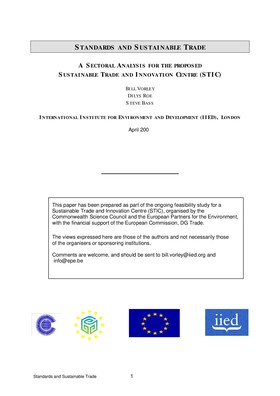Standards and sustainable trade. A sectoral analysis for the proposed sustainable trade and innovation centre (STIC)
In the search for alternative markets in face of globalisation, the export of environmentally friendly and socially preferred goods and services from the South is increasingly sold as a
developmental ‘win-win-win’, providing trade opportunities which can simultaneously alleviate poverty and protect the environment.
The challenge is to connect the rhetoric of sustainable trade with reality, bridging the gaps between emerging practices such as sustainable forestry, organic agriculture, and ecotourism
with markets for small- and mid-sized producers and ntrepreneurs, who are the intended beneficiaries. The needs of sustainability and the needs of a liberalised trading
system are very different. Within the development debate, advocacy and research on competitiveness, trade and business development on one hand and on poverty alleviation on the other, often take place in separate camps. In both cases, “the separate groups are like two adventurers following roughly parallel paths that do not cross”. Opportunities for complementarities are therefore missed.
This report sets out to unpack the issues around standards for sustainability and market access, using case studies from food, forestry and tourism as examples. Within the plethora
of grades and standards we focus on voluntary environmental and social process standards, certification systems and codes, usually developed by the private sector, sometimes in partnership with government. We conclude with a set of recommendations for the
establishment of a Sustainable Trade and Innovation Centre.
Cite this publication
Available at https://www.iied.org/g02162
